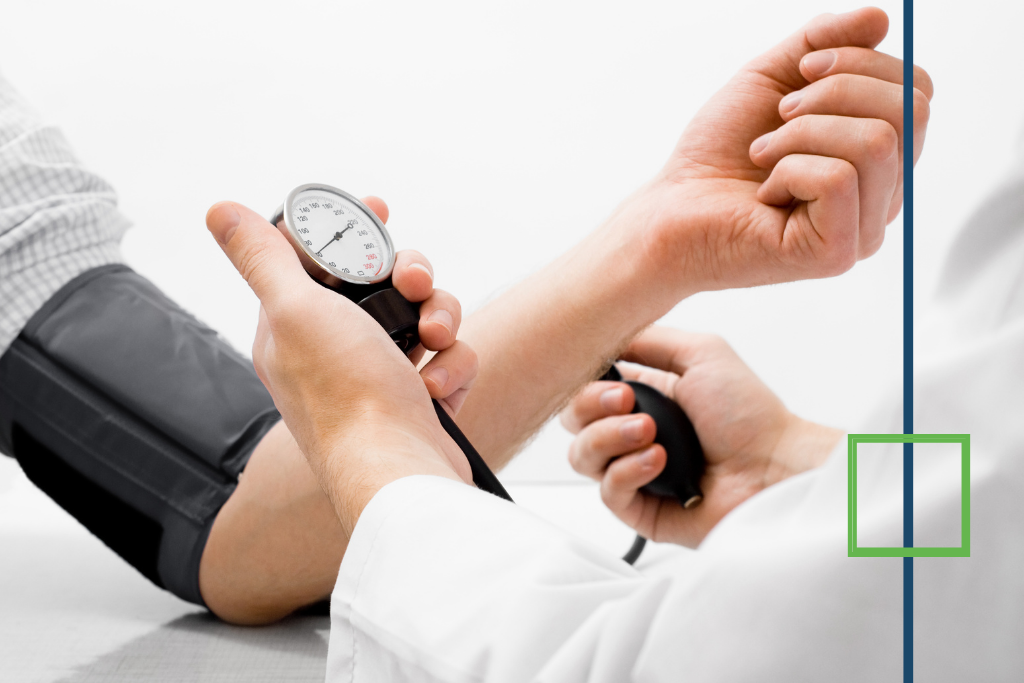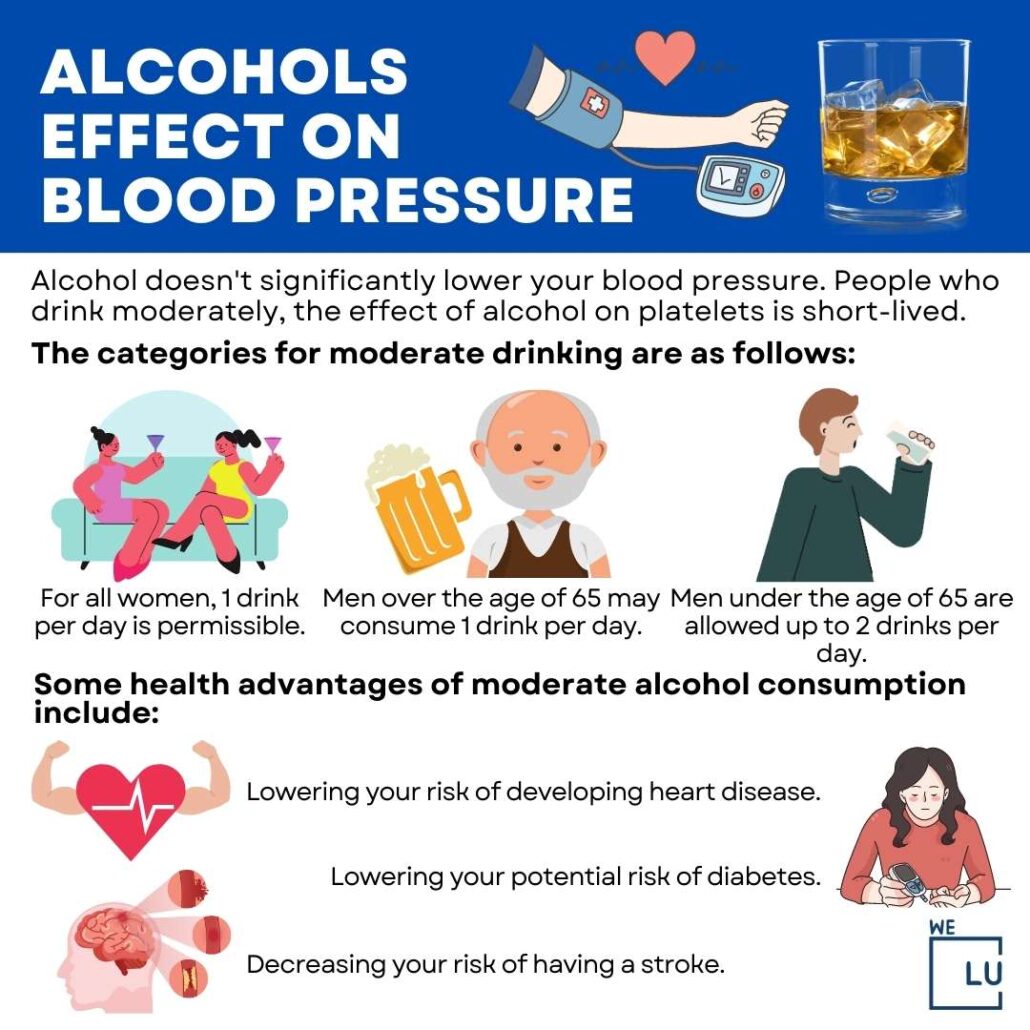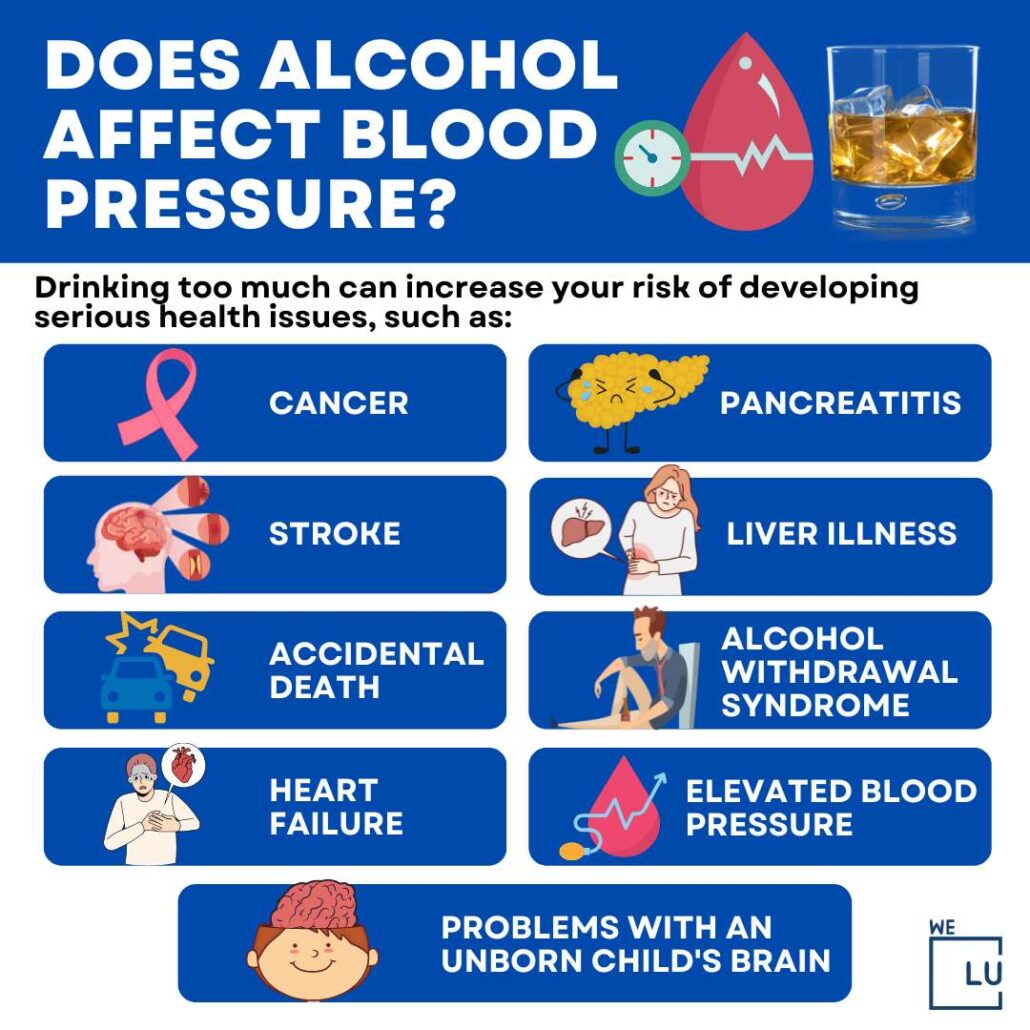Does Alcohol Thin Your Blood?
Most of us are familiar with the idea that alcohol thins the blood, but what does this mean exactly? And how does it affect your body and your overall health? Before we discuss the effects of alcohol on your blood, it’s helpful to understand the nature of blood itself.
Blood consists of a liquid part called plasma, and a number of different cell types that each performs a specific role within the circulatory system:
- Red blood cells, or erythrocytes, are responsible for providing oxygen to the tissues of the body
- White blood cells, or leukocytes, are a key element in the immune system and play a critical role in defending the body against infection
- Platelets are small, colorless cells that allow your blood to clot following injury
Thin blood results from a reduction in the number of platelets. It is a condition known as thrombocytopenia. In a normal person, the concentration of platelets can be anywhere from 150,000 to 450,000 per microliter of blood, but in individuals with thrombocytopenia, this drops below 150,000.

Small reductions in the platelet count are not usually severe, but more substantial losses can pose a significant health risk. This can be when your bone marrow produces insufficient platelets or when platelet production is adequate but doesn’t survive in the body.
Sometimes when it comes to causes of diminished platelet activity, nutritional deficiency is a common factor. This is because your body needs sufficient amounts of iron, folate, and vitamin B12 to produce platelets. These elements are ordinarily provided by a healthy, varied diet that is rich in fruits, vegetables, and high-quality proteins. This helps us understand why alcohol consumption is often associated with thrombocytopenia. Alcohol impairs the body’s ability to absorb vitamin B12, which then impacts platelet production.

Get Your Life Back
Find Hope & Recovery. Get Safe Comfortable Detox, Addiction Rehab & Mental Health Dual Diagnosis High-Quality Care at the We Level Up Treatment Centers Network.
Hotline (877) 378-4154How Does Alcohol Thin Blood?
Alcohol can act as an anticoagulant in moderate amounts. Coagulation refers to when blood cells stick together and form clumps. These clumps can form partial blockages in your blood vessels that raise pressure.
The strain on your vessels can cause your blood vessel walls to thicken, which further raises blood pressure. If a block forms in the brain, it can cause an ischemic stroke, which starves parts of the brain of oxygen. If a clot forms in the heart, it can cause cardiac arrest. Certain medications are used to thin the blood in people with hypertension. Since alcoholism can thin the blood in a similar way, it can help prevent strokes and heart attacks.
However, it’s worth noting that thinning the blood may increase your risk of a different kind of stroke called a hemorrhagic stroke. Blood vessel blockages can also form because of high-cholesterol diets. Plaque build-up can cause blockages in your blood vessels that can swell and burst. Blood will start to pour out of the vessel but will quickly clot to plug the hole. This can often make the blockage work, but at least you aren’t bleeding. If you have thin blood, you may hemorrhage more blood before it’s able to clot. In cases where alcohol or blood thinners are used in excess, ruptures can cause a stroke because not enough blood makes it to the brain.
Because alcohol can thin your blood, you are discouraged from drinking it before medical surgery. Drinking alcohol within 24 hours of surgery can cause you to bleed more throughout the procedure. In very bad cases, it can cause people to bleed out and die. In other cases, blood can be difficult to manage, which can obscure what the surgeon is trying to do, leading to complications.
How Much Alcohol Does it Take to Thin Your Blood?
Moderate alcohol consumption may reduce some of the “stickiness” of red blood cells, which can lower the odds of blood clotting. Blood clots in thickened arteries or veins are often what contributes to heart attacks and strokes. By reducing the likelihood that these blood cells will stick together and form a clot, alcohol may then “thin” the blood and help to prevent cardiac complications. Acting as a blood thinner, alcohol can then also lower the risk for a stroke, which is when there is a reduced flow of blood to the brain due to blocked or narrowed arteries.
Alcohol is mostly broken down in the liver, which serves to filter out toxins from the blood. Alcohol can stimulate the liver to then increase the production of HDL (high-density lipoprotein cholesterol), which can then work to break down LDL (low-density lipoprotein cholesterol). HDL is considered “good” cholesterol while LDL is classified as “bad” cholesterol, a buildup of which can be a contributing factor in a heart attack. So, in a sense, alcohol can help to create a healthy balance of good cholesterol versus bad cholesterol, further lowering the odds of a heart attack or stroke.
Does Alcohol Thin Blood? The heart benefits and reduction of the rate of coronary heart disease (CHD) from alcohol are thought to impact men who are over 40 and women who are post-menopausal most often. The British Heart Foundation (BHF) publishes that while post-menopausal women who drank alcohol did seem to have a lower rate of CHD, they also had a higher rate of breast cancer.
The National Institute on Alcohol Abuse and Alcoholism (NIAAA) [1] reports that moderate alcohol consumption may have some health benefits, which can include:
- Lowered risk of heart attack
- Reduced rate of mortality from heart disease
- Lowered risk of ischemic stroke
- Lessened odds for developing diabetes

These potential health benefits are based on moderate alcohol consumption, however, which the Dietary Guidelines for Healthy Americans 2015-2020 outline to be up to one drink per day for a woman and up to two drinks per day for a man. Men and women metabolize alcohol differently, which plays a role in why the drink totals are different based on gender. A standard “drink” refers to one glass of wine (five ounces of 7% alcohol), one beer (12 ounces of 5% alcohol), or one shot of distilled spirits (1.5 ounces of 80 proof liquor containing 40% alcohol).
The guidelines do not recommend that a person who doesn’t drink start doing so, as alcohol can also have many negative physical, behavioral, social, and emotional consequences. Similarly, someone who has a family history of alcoholism or other biological or environmental risk factors should not drink alcohol either, even in moderation.
Get Help. Get Better. Get Your Life Back.
Searching for Accredited Drug & Alcohol Rehab Centers Near You? Or Mental Health Support?
Even if you have failed previously, relapsed, or are in a difficult crisis, we stand ready to support you. Our trusted behavioral health specialists will not give up on you. Call us when you feel ready or want someone to speak to about therapy alternatives to change your life. Even if we cannot assist you, we will lead you wherever you can get support. There is no obligation. Call our hotline today.
FREE Addiction Hotline – Call 24/7Does Alcohol Thin Blood? Infographic
Your blood pressure is not significantly lowered by alcohol. Alcohol has a transient effect on platelets in people who drink in moderation.

Embed the above “Alcohols Effect on Blood Pressure” Infographic to your Website. This infographic is provided by the We Level Up addiction treatment center team. To use the above infographics, you agree to link back and attribute its source and owner at https://welevelupnj.com/addiction/does-alcohol-thin-blood/
Alcohols Effect on Blood Pressure image link: https://welevelupnj.com/wp-content/uploads/2023/04/Alcohols-Effect-On-Blood-Pressure-1030×1030.jpg

Embed the above “Alcohols Effect on Blood Pressure” Infographic to your Website. This infographic is provided by the We Level Up addiction treatment center team. To use the above infographics, you agree to link back and attribute its source and owner at https://welevelupnj.com/addiction/does-alcohol-thin-blood/
Alcohols Effect on Blood Pressure image link: https://welevelupnj.com/wp-content/uploads/2023/04/Alcohols-Effect-On-Blood-Pressure-1030×1030.jpg
How Long Does Alcohol Thin Your Blood?
It is not really known whether the function of alcohol as a blood thinner lasts long enough for its moderate consumption in the absence of other medicine. For patients with cardiac problems, in particular, it is important not to depend entirely on the consumption of alcohol for the treatment of clot formation. At best, the effect of alcohol can last long enough if it is consumed in moderation and on every alternate day.
When you’re injured, blood cells called platelets rush to the injury site. These cells are sticky, and they clump together. Platelets also release proteins called clotting factors that form a plug to close the hole. Clotting is beneficial when you’re injured.
But sometimes, a blood clot can form in — or travel to — an artery that supplies your heart or brain with oxygen-rich blood. Clotting of the blood is called thrombosis.
When a clot blocks blood flow to your heart, it can cause a heart attack. If it blocks the blood flow to your brain, it can cause a stroke.
Alcohol interferes with the clotting process in a couple of ways:
- It reduces the number of platelets in the blood, in part by interfering with blood cell production in the bone marrow.
- It makes the platelets you do have less sticky.
Drinking a glass or two of wine each day might reduce your risk for heart disease and strokes caused by blockages in blood vessels (ischemic strokes) in much the same way that taking a daily aspirin can prevent strokes.
Mixing Alcohol and Blood Thinners
Does Alcohol Thin Blood? Most doctors and healthcare professionals advise using caution when mixing alcohol and blood-thinning medications like warfarin. Since both alcohol and anticoagulant drugs reduce the clotting ability of the blood, consuming them together can magnify their effects and increase your risk of stroke.
In addition to this, alcohol can impair your body’s ability to break down and remove the anticoagulant medication, which can lead to an undesirable and potentially toxic accumulation of the drug in your body.
For these key reasons, many physicians and health experts suggest avoiding alcoholic drinks while taking anticoagulant medication.
Alcohol Recovery Treatment
The good news is that no matter how severe the problem may seem, most people with an alcohol use disorder can benefit from some form of treatment. Research shows that about one-third of people who are treated for alcohol problems have no further symptoms 1 year later. Many others substantially reduce their drinking and report fewer alcohol-related problems.
When asked how alcohol problems are treated, people commonly think of 12-step programs or 28-day inpatient rehab. Ultimately, there is no one-size-fits-all solution, and what may work for one person may not be a good fit for someone else. Simply understanding the different options can be an important first step.
First-class Facilities & Amenities
World-class High-Quality Addiction & Mental Health Rehabilitation Treatment
Rehab Centers TourRenowned Addiction Centers. Serene Private Facilities. Inpatient rehab programs vary.
Addiction Helpline (877) 378-4154Proven recovery success experience, backed by a Team w/ History of:
15+
Years of Unified Experience
100s
5-Star Reviews Across Our Centers
10K
Recovery Success Stories Across Our Network
- Low Patient to Therapist Ratio
- Onsite Medical Detox Center
- Comprehensive Dual-Diagnosis Treatment
- Complimentary Family & Alumni Programs
- Coaching, Recovery & Personal Development Events
Behavioral Treatments
Behavioral treatments are aimed at changing drinking behavior through counseling. They are led by health professionals and supported by studies showing they can be beneficial.
Types of Behavioral Treatments
- Cognitive–Behavioral Therapy (CBT) can take place one-on-one with a therapist or in small groups. This form of therapy is focused on identifying the feelings and situations (called “cues”) that lead to heavy drinking and managing stress that can lead to relapse.
- Motivational Enhancement Therapy is conducted over a short period of time to build and strengthen motivation to change drinking behavior.
- Marital and Family Counseling incorporates spouses and other family members in the treatment process and can play an important role in repairing and improving family relationships.
- Brief Interventions are short, one-on-one or small-group counseling sessions that are time limited. The counselor provides information about the individual’s drinking pattern and potential risks.
Medications
Three medications are currently approved in the United States to help people stop or reduce their drinking and prevent relapse. They are prescribed by a primary care physician or other health professional and may be used alone or in combination with counseling.
The U.S. Food and Drug Administration (FDA) [2] has approved three medications for treating alcohol dependence, and others are being tested to determine if they are effective.
- Naltrexone can help people reduce heavy drinking.
- Acamprosate makes it easier to maintain abstinence.
- Disulfiram blocks the breakdown (metabolism) of alcohol by the body, causing unpleasant symptoms such as nausea and flushing of the skin. Those unpleasant effects can help some people avoid drinking while taking disulfiram.
It is important to remember that not all people will respond to medications, but for a subset of individuals, they can be an important tool in overcoming alcohol dependence.
World-class, Accredited, 5-Star Reviewed, Effective Addiction & Mental Health Programs. Complete Behavioral Health Inpatient Rehab, Detox plus Co-occuring Disorders Therapy.
CALL (877) 378-4154End the Addiction Pain. End the Emotional Rollercoaster. Get Your Life Back. Start Drug, Alcohol & Dual Diagnosis Mental Health Treatment Now. Get Free No-obligation Guidance by Substance Abuse Specialists Who Understand Addiction & Mental Health Recovery & Know How to Help.
Mutual-Support Groups
Alcoholics Anonymous (AA) and other 12-step programs provide peer support for people quitting or cutting back on their drinking. Combined with treatment led by health professionals, mutual-support groups can offer a valuable added layer of support.
Relapse is common among people who overcome alcohol problems. People with drinking problems are most likely to relapse during periods of stress or when exposed to people or places associated with past drinking.
Depression and anxiety often go hand in hand with heavy drinking. Studies show that people who are alcohol dependent are two to three times as likely to suffer from major depression or anxiety over their lifetime. When addressing drinking problems, it’s important to also seek treatment for any accompanying medical and mental health issues.
Does alcohol thin blood? Yes, but heavy drinking has been consistently identified as a risk factor for this type of stroke, which is caused by bleeding in the brain rather than a blood clot It’s important to keep in mind that drinking large amounts of alcohol contributes to a more severe form of a stroke at a younger age in people who had no significant past medical history.
If you are suffering from alcoholism, contact us today at Wel Level Up NJ to discuss treatment options and find out how we can help you begin your journey to recovery – and guide you every step of the way!

Experience Transformative Recovery at the We Level Up Treatment Center.
See our authentic success stories. Get inspired. Get the help you deserve.



Start a New Life
Begin with a free call to an addiction & behavioral health treatment advisor. Learn more about our dual-diagnosis programs. The We Level Up treatment center network delivers various recovery programs at each treatment facility. Call to learn more.
- Personalized Care
- Caring Accountable Staff
- World-class Amenities
- Licensed & Accredited
- Renowned w/ 5-Star Reviews